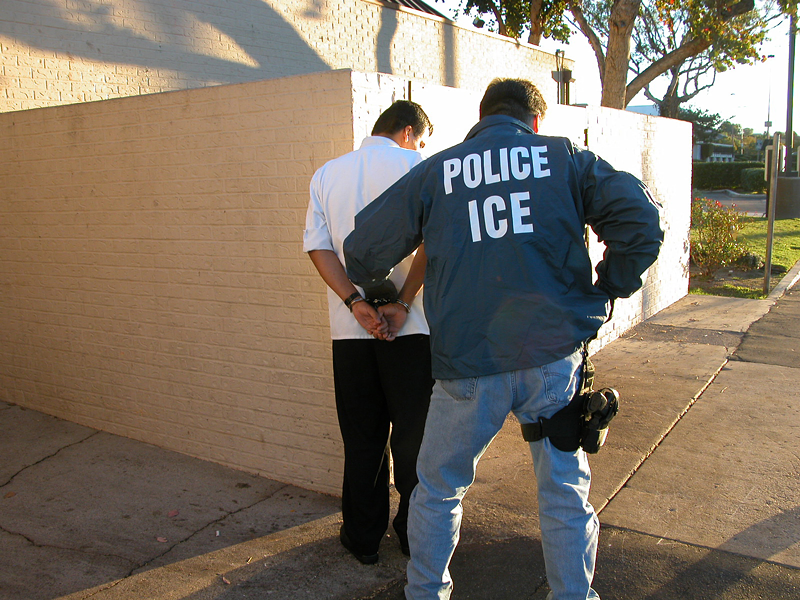Intense feelings of fear and loss. Dramatic changes to daily routine. Economic hardship. Bullying. Anxiety. Depression. Aberrant behavior. PTSD. All were experienced by children and parents affected by two Ohio ICE worksite raids in June 2018.
On June 5, 2018, ICE agents raided two locations of Corso's Flower & Garden Center in the Sandusky area, arresting 114 people. Two weeks later, agents raided the Salem, Ohio meatpacking plant Fresh Mark, arresting 146, almost all of whom were Guatemalan immigrants, and many of whom were seeking asylum, having fled violence and persecution in their home country.
Researchers with the Center for Law and Social Policy (CLASP) visited both sites in December 2019, as part of a larger study documenting the effects of ICE worksite raids. The CLASP team interviewed legal service providers, community organizers, social workers and government officials as well as nearly 30 immigrants directly affected by the Ohio raids. They conducted similar site visits in Mississippi and Texas. The report's findings were, "in a word, devastating."
"The impact of raids on families, communities, and children — many of whom are U.S. citizens — was the complete devastation of family economic security and mental and physical wellbeing," the summary reads.
And in the words of an Ohio service provider: “Family separation is family separation, whether it’s a border agent prying a baby from its mom’s arms or leaving a kid at school with no one to pick them up. It’s the same crime against humanity I would say.”
Researchers found that children of workers at the raided sites were separated from their parents for up to several months. In both the Ohio and Mississippi raids, some parents were held at prisons or detention facilities hours away from their homes and were unable to see their children for the duration of their detention.
In multiple cases, ICE did not notify area service providers of the coming raids and local advocates had to intervene to ensure that young children were placed with family members instead of child protective services. After separation, children experienced symptoms consistent with PTSD, including heightened fear, trouble sleeping and emotional volatility. Parents also suffered severe negative emotional and mental health impacts. The researchers noted how closely linked the mental health of children is with their parents.
In the Ohio cases, researchers noted a paranoia that followed the raids that drastically affected how families were able to live their daily lives.
"Children no longer played outside," the report said, discussing the aftermath of the Sandusky raid, "and soccer games ceased as families stayed hidden in their homes. Children were also very scared of opening the door and often begged their parents not to leave the house. A mom in Ohio described her seven-year-old son who always wants to know her whereabouts for the day before he leaves for school. When she goes on an errand — like to the grocery store — 'he stays there waiting' for her to come back."
Ohio respondents also told researchers that anti-immigrant sentiment, including bullying at school, had increased.
The report noted, in Ohio specifically, how workers were often subjected to long hours and dehumanizing conditions, and yet the workers were often exemplary employees. They told researchers that they endured low pay and terrible conditions to give their children a better shot. And yet when the ICE agents came, workers were treated like dangerous criminals. They were yelled at and pushed and shoved during their arrest and transport.
The raids had enduring economic impacts on many of the families. In Salem, Ohio, for example, one priest said that a fourth of the Guatemalan families in his congregation had to move as a result of the raid and he had no idea what happened to them.
In one heartbreaking case documented in the report, a 16-year-old Ohioan was arrested in the Fresh Mark raid, though he was a U.S. citizen and a minor. He told researchers that his biggest concern is that he won't turn 18 before his parents' deportation proceedings conclude and might not be able to take on full custody of his two younger siblings.
"If my parents get deported," the boy said, "I’d fight to have my brother and sister stay. I’d have to drop out of school to get a good job — labor job — to be able to pay rent, food, everything. I’d become the new parent for the family. I already kind of had to take up the role because my mom had to work all the time. We don’t have family here. Everyone else we know are in the same situation."






